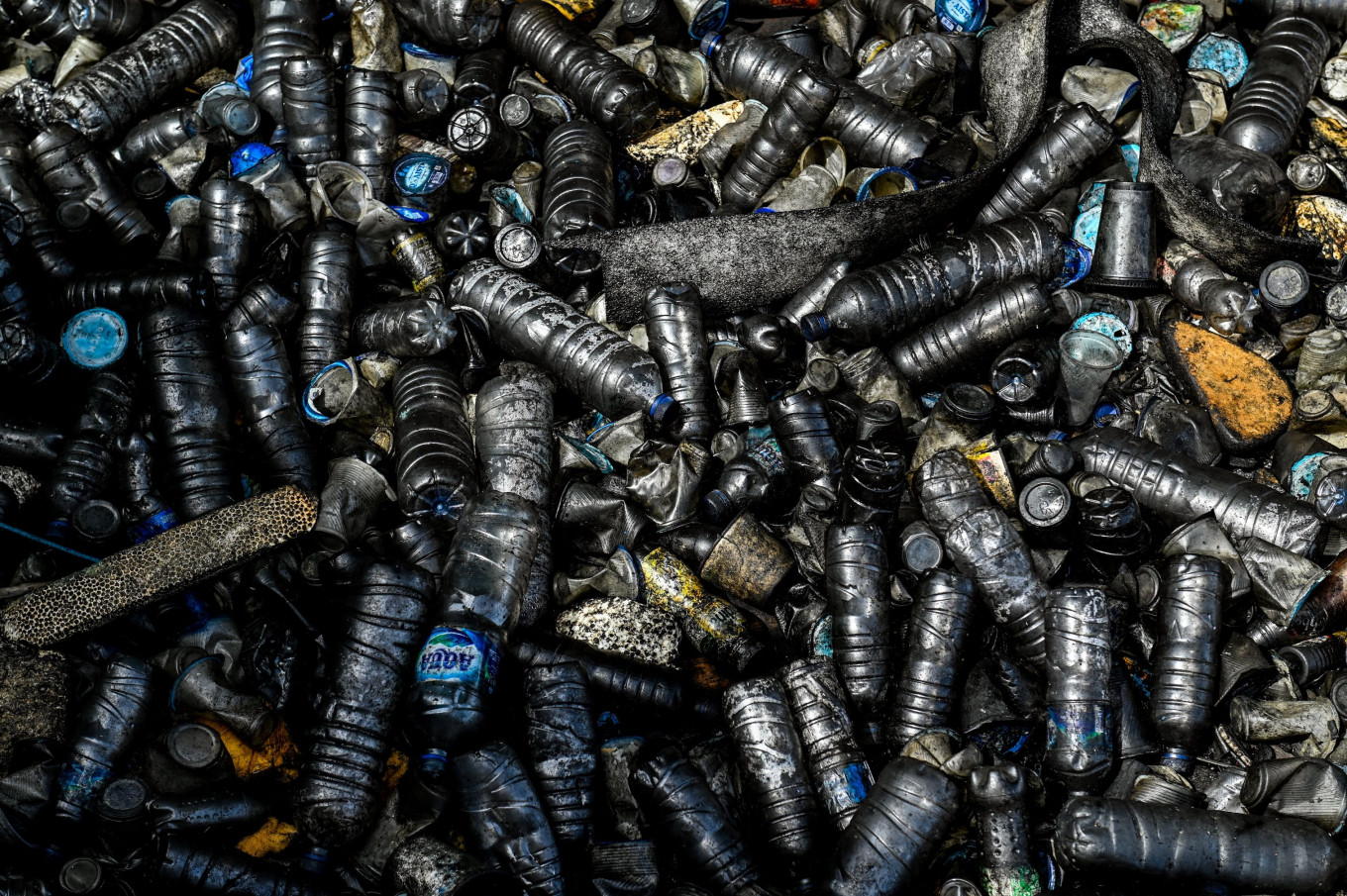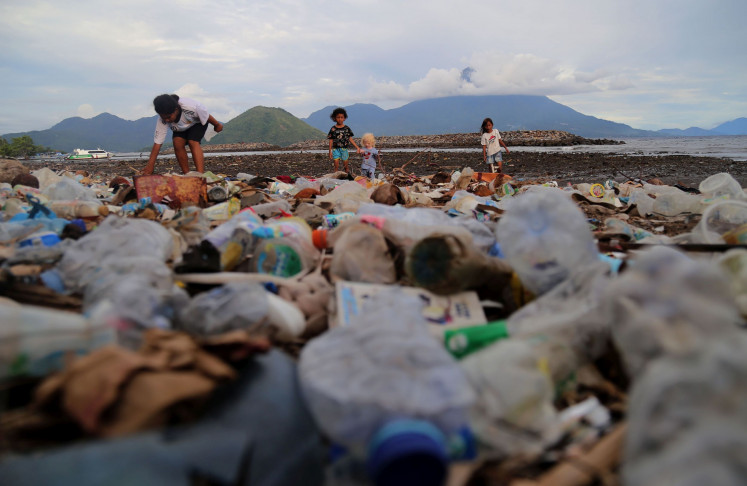Popular Reads
Top Results
Can't find what you're looking for?
View all search resultsPopular Reads
Top Results
Can't find what you're looking for?
View all search resultsMessage in a bottle: Could a deposit boost recycling in RI?
Change text size
Gift Premium Articles
to Anyone
B
ottle deposit schemes are used in numerous countries to make recycling more cost efficient. Some experts say they could boost waste collection in Indonesia, too, but others prefer to build on existing waste management concepts.
A bottle deposit is a small fee customers pay with every bottled beverage they buy, but which they get back when they return the empty container to a collection point. From there, empty containers are sent in bulk to recycling facilities.
Alliance of Zero Waste Indonesia (AZWI) co-coordinator and communication officer Abdul Ghofar said such a scheme served as “a catalyst” for people to return packaging and would be easy to adopt in developing countries.
"It makes sense to implement a cashback scheme in Indonesia," said Ghofar while pointing out that the implementation of deposit schemes varied among countries.
In Germany’s Pfand system, a deposit is placed on a wide range of single-use beverage packaging encompassing plastic or glass bottles as well as aluminum cans. Consumers can return the containers either to the place of purchase or to another vendor. Reverse vending machines often automate the reimbursement.
Ghofar pointed out that deposit schemes for some reusable containers already existed in Indonesia, namely for gas cylinders and for the 19-liter bottles used in water dispensers across the country.
As for single-use containers, he argued such a policy would contradict the Environment and Forestry Ministry’s commitment to achieving zero waste by 2050. AZWI campaigns for abandoning plastic altogether.
He highlighted that, despite having wide success with 98 percent overall redemption for its single-use containers in Germany, the Pfand system had led to the growing popularity of single-use items.
Read also: Zero waste: Buzz words or conceivable solid waste management?
Angelique Dewi, a plastic circular-economy expert at consulting firm PT Cendekia Iklim Indonesia, reckons a deposit scheme is not feasible in Indonesia, unless subsidized by producers or the government.
"A deposit scheme has actually been applied to reusable glass bottles. For example, for a bottle of beer costing Rp 20,000 [US$1.34], [buyers] would be refunded Rp 500 upon returning the empty bottle. This means only 2.5 percent of the price,” Angelique told The Jakarta Post on Monday, referring to schemes limited to eateries (rather than end consumers) returning bottles to producers.
She continued, "In Germany, a can of coke costs 1.15 euros (Rp 18,600) against a deposit of 25 cents,” noting that at around 20 percent, the incentive was much greater there. “Also, we can see that people don't mind paying the Rp 200 plastic bag fee."
Deposit scheme not on cards
Despite supercharging collection rates, a deposit scheme like the German one is not planned in Indonesia.
The Environment and Forestry Ministry’s Hazardous Waste, Garbage and Toxic Substances Management Director General Rosa Vivien Ratnawati noted instead: “We have built a system regulated by the ministerial regulations on the obligation to redesign packaging and withdraw packaging that becomes waste.”
She suggested that producers cooperate with waste banks as collection centers to gather discarded packaging and bolster the waste management ecosystem.
A waste bank is a community-based collection point where people can drop off solid household waste. Akin to a commercial bank, the deposits (of waste instead of cash) are credited to a person’s account, which is done by assigning a monetary value based on the amount and type of trash, and depositors can withdraw money from their accumulated savings.
Ghofar, however, pointed out that collection rates through waste banks were still low and said there was a lack of support from the government, as well as from the private sector, as waste bank partnerships were often not profitable.
"Currently, waste banks that operate optimally are sustained by their focus on collecting high-value and profitable recyclable waste," said Ghofar, explaining that this would usually be polyethylene terephthalate (PET) packaging.
“There are only a few waste banks that partner directly with fast-moving consumer goods companies, so even the collection rate for returning packaging waste to these companies is also very limited,” he added.
Angelique had a different take on it, pointing out that many waste banks had grown over the years.
"I see greater potential for [waste] banks. If they are managed well and able to work with corporations, waste banks can be self-sufficient and self-sustained."
Incentives for unsung heroes
Angelique said waste management actors, both informal waste collectors and communities using the waste bank, needed to be incentivized to sustain their efforts.
Admitting that many waste banks were losing money and not making a profit, Angelique told the Post that "incentivizing communities is not the problem at the moment, since collection and sorting rates are still low."
Waste banks and plastic recycling companies had incentivized informal waste collectors and rewarded individuals for handling their plastic waste, Angelique added, but some of the businesses were not as profitable as others.
She opined that waste management was "a combination of social work and business", adding that waste banks were not merely charity [projects] and noting that workers there needed to be remunerated.
Similarly, Ghofar, demanded that the authorities provide decent wages and incentives for waste pickers and collectors as the main actors in this informal business, who were the "forgotten link" in waste management in Indonesia.
"Incentives could get the community involved to increase the collection rate by 20 to 30 percent and help increase the recycling rate," said Ghofar, who is also a campaign officer for the Indonesian Forum for the Environment (WALHI).
According to the World Bank, Indonesia’s waste management sector is significantly underfunded. Local government allocations of $5 to $6 per capita/per annum are much lower than the international benchmark of $15 to 20 per capita/per annum.
Plastic pollution is part of the broader problem of waste management. Waste management in Indonesia currently focuses on the 3R (reuse, reduce, recycle) paradigm governed by the Solid Waste Management Law.
Only 10 percent of plastic waste was recycled in 2019, mostly in the form of rigid plastic, PET, high-density polyethylene (HDPE), low-density polyethylene (LDPE) and polypropylene (PP), while flexible plastics are commonly burned or dumped, as recycling them is not economically feasible.











